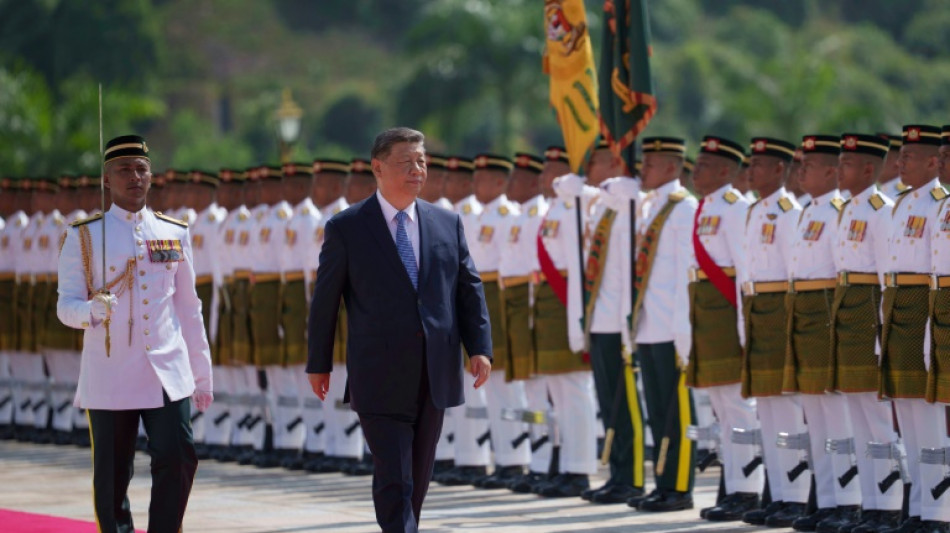
NGG
0.6300

Chinese President Xi Jinping met Malaysia's king on Wednesday in a state visit analysts said was aimed at burnishing Beijing's credentials as a reliable partner and "not a hegemon".
Xi embarked this week on a Southeast Asia tour that has already taken him to Vietnam and will also include Cambodia, with Beijing trying to position itself as a stable alternative to US President Donald Trump's punitive tariff regime.
Xi was welcomed by Malaysia's king, Sultan Ibrahim, in a colourful ceremony at the golden-domed palace on Wednesday.
The Chinese leader walked on a red carpet as he inspected an honour guard on the sprawling palace grounds as a Malaysian royal band played.
After an audience and lunch with the king, Xi met Prime Minister Anwar Ibrahim at the administrative capital of Putrajaya outside Kuala Lumpur to discuss bilateral cooperation and other regional matters.
They witnessed the exchange of a range of agreements to cooperate on sectors such as emerging technologies, artificial intelligence, media, film and tourism.
Anwar will host Xi for dinner at his official residence in Putrajaya later on Wednesday.
"It's not just about friendship, it's about realigning the regional centre of gravity towards Beijing," said Khoo Ying Hooi, an associate professor in the Department of International and Strategic Studies at Malaya University.
She told AFP that the visit was a calculated move to "test the waters for regional solidarity at a time when US trade measures are disrupting global markets".
Members of the Association of Southeast Asian Nations (ASEAN) regional bloc have been among the hardest hit by the US tariffs, which risked alienating even Washington's friends and allies.
Malaysia is this year's ASEAN chair.
- 'Implicit warning' -
ASEAN member Vietnam, a manufacturing powerhouse, was slapped with 46 percent tariffs and Cambodia -- a major producer of low-cost clothing for big Western brands -- was hit with a 49 percent duty.
Malaysia, Southeast Asia's third-largest economy, was hit with a 24 percent tariff.
The tariffs have been paused for 90 days but Trump has said no country is "off the hook".
"Regionally, Xi is likely to frame China as a partner in stability and development, not a hegemon," Khoo said.
"At the same time, his message carries an implicit warning, that is: don't let Washington's tariffs or alliances undermine Asia's own regional cohesion," she said.
Oh Ei Sun from the Pacific Research Center of Malaysia think tank said Xi's visit is like "a group of friends huddling together for warmth against harsh weather".
Xi said on his arrival on Tuesday that he hopes his visit will usher in another "50 golden years" in China-Malaysia relations.
"I am confident that with our joint efforts, this will be a fruitful visit," Xi said in a statement issued by the Chinese Embassy in Kuala Lumpur.
China and Malaysia celebrated their 50th anniversary of diplomatic relations last year and enjoy robust trade ties, although Malaysia claims parts of the South China Sea over which Beijing has staked out near-blanket sovereignty.
China has been Malaysia's largest trading partner for 16 consecutive years, with total trade between the two countries accounting for 16.8 percent of Malaysia's global trade last year, according to the Malaysian foreign ministry.
Xi vowed in an opinion piece published in Malaysia's The Star newspaper on Tuesday that China will work with Southeast Asian countries to fight protectionism and keep global supply chains stable.
"We must uphold the multilateral trading system, keep global industrial and supply chains stable, and maintain an international environment of openness and cooperation," Xi said.
Xi will travel on Thursday to Cambodia, one of China's staunchest allies in Southeast Asia and where Beijing has extended its influence in recent years.
N.Simek--TPP